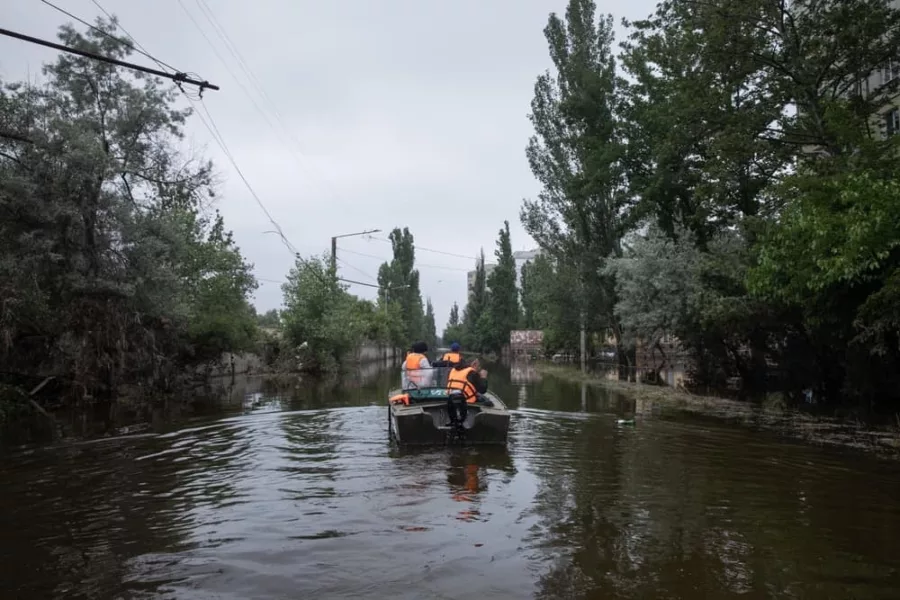The environmental impacts of Russia’s war on Ukraine concern us all

On 18 July, Fellows, UK parliamentarians and environmental experts discussed the impact of Russia’s war on Ukraine on the environment and what can be done to better monitor the damage and bring Russia to justice.
Ukrainian Fellows Pavlo Khazan and Olya Melen-Zabramna spoke about their work to assess the environmental damage Russia’s war is wreaking upon Ukraine, to hold Russia accountable for ecocide, and to build Ukraine back greener. The discussion was chaired by Alex Sobel MP, co-chair of the Ukraine All-Party Parliamentary Group (APPG) and shadow minister for the Department for Environment, Food and Rural Affairs.
Landscapes, nature and agriculture
Pavlo is a Member of the Ecological and Energy Committee, Dnipropetrovsk Regional Council and now a Lieutenant Colonel in Ukraine’s Armed Forces. He recently contributed to a report on the environmental impacts of the war. He outlined how, “the war is very much affecting our environment, destroying our landscapes, nature, agriculture, everything.”
For instance, toxic chemicals emitted from weapons and abandoned military equipment, including depleted uranium released by shells and missiles, are extremely dangerous and polluting. The bombing of industrial buildings has also released toxic chemicals and the destruction of housing has caused sewage and gas leaks.
There have also been indirect environmental consequences, such as increased pressure on waste, water and energy systems in those areas hosting the estimated eight million people displaced within Ukraine. The recent destruction of Kahovska dam has left 50,000 houses completely under the water, making many people homeless. With these pressures comes an increased risk of diseases spreading.
Ecocide
Olya is Head of the legal unit at Environment People Law (EPL), a public interest organisation in Ukraine committed to protecting environmental rights. She spoke about the destruction of the Kahovska dam – which released around 18 cubic kilometres of water from the Dnipro River, leaving 5,000 square kilometres of land under water – as “a case of ecocide” committed by the Russian army, and it was recently described as such by President Zelensky. The dam’s destruction has “had huge consequences not only for the environment but for the people and their wellbeing, and for future generations of Ukraine,” Olya said.
The Ukraine APPG is among those advocating for ecocide to be formally recognised as a crime by the International Criminal Court.
Global impact
Flooding from the dam’s destruction has covered 10,000 hectares of agricultural lands in river sediment, accumulating numerous pollutants from factories upstream. The area has also been polluted by domestic, industrial and agricultural waste, dead animals and other hazardous debris generated by the flooding.
Migratory birds have been heavily affected. The dam was destroyed during nesting season, so they have lost a generation of chicks as well as their feeding grounds. The decimation of bird populations in Ukraine will lead to a drop in migratory birds in the UK and elsewhere, explained Olya.
This is just one example of the widespread environmental impact the war is having not just nationally, but globally. Countries bordering the Black Sea have also been affected. Alongside the debris, crude oil has been discharged into the sea and aquatic life in Ukraine’s coastal areas is suffering.

Reparations
In response to the destruction of the dam, an International High-level Working Group on the Environmental Consequences of War has been set up. This group aims to accurately assess the damage so Russia can be held accountable and develop plans for environmental restoration in Ukraine and the transition to a green economy.
Olya said: “This is our huge task for the future, but other countries affected must also assist Ukraine in calculating the damage to their own environment and put this in a future claim against the Russian Federation for compensation. Ukraine has made a preliminary estimation that close to US$2 billion of direct damage to the environment was done by this act of ecocide.”
Both Pavlo and Olya stressed that calculations of the damage to the environment are preliminary. It is very difficult to estimate the extent of the harm in regions occupied by Russia and in heavily mined areas, which include the Black Sea and a large number of forests. Ukraine lacks the resources it needs to accurately assess the damage, such as scientific staff, lab capacity and equipment. This is one area where the UK could provide support.
Pavlo also described how the report looked into the lessons learned from past wars for guidance on international reparations mechanisms. He stressed the importance of keeping citizens of Ukraine and neighbouring countries informed of the enormity of the environmental consequences of this war.
Building back greener
The conflict also threatens urgent environmental priorities such as carbon emissions reduction, which is a “serious challenge for all humanity,” Pavlo said. The Conflict and Environment Observatory shared a report, Climate Damage Caused By Russia’s War In Ukraine, which estimates greenhouse gas emissions due to the war. According to the report, emissions from the first 12 months of the war were equivalent to the annual emissions of the whole of Belgium.
When Ukraine rebuilds its cities, said Pavlo, it should aspire to “build back better” by meeting European standards of sustainable development as part of a transition to a green economy. Bringing Ukraine’s environmental standards into line with those of the EU is also important for the country’s hopes of EU membership. Olya reiterated this and explained that civil society efforts would be crucial in this regard. It is Olya’s hope that Ukraine will take into consideration the EU’s Green Deal in the future: “We want to rebuild a better Ukraine than it was before,” she said.
